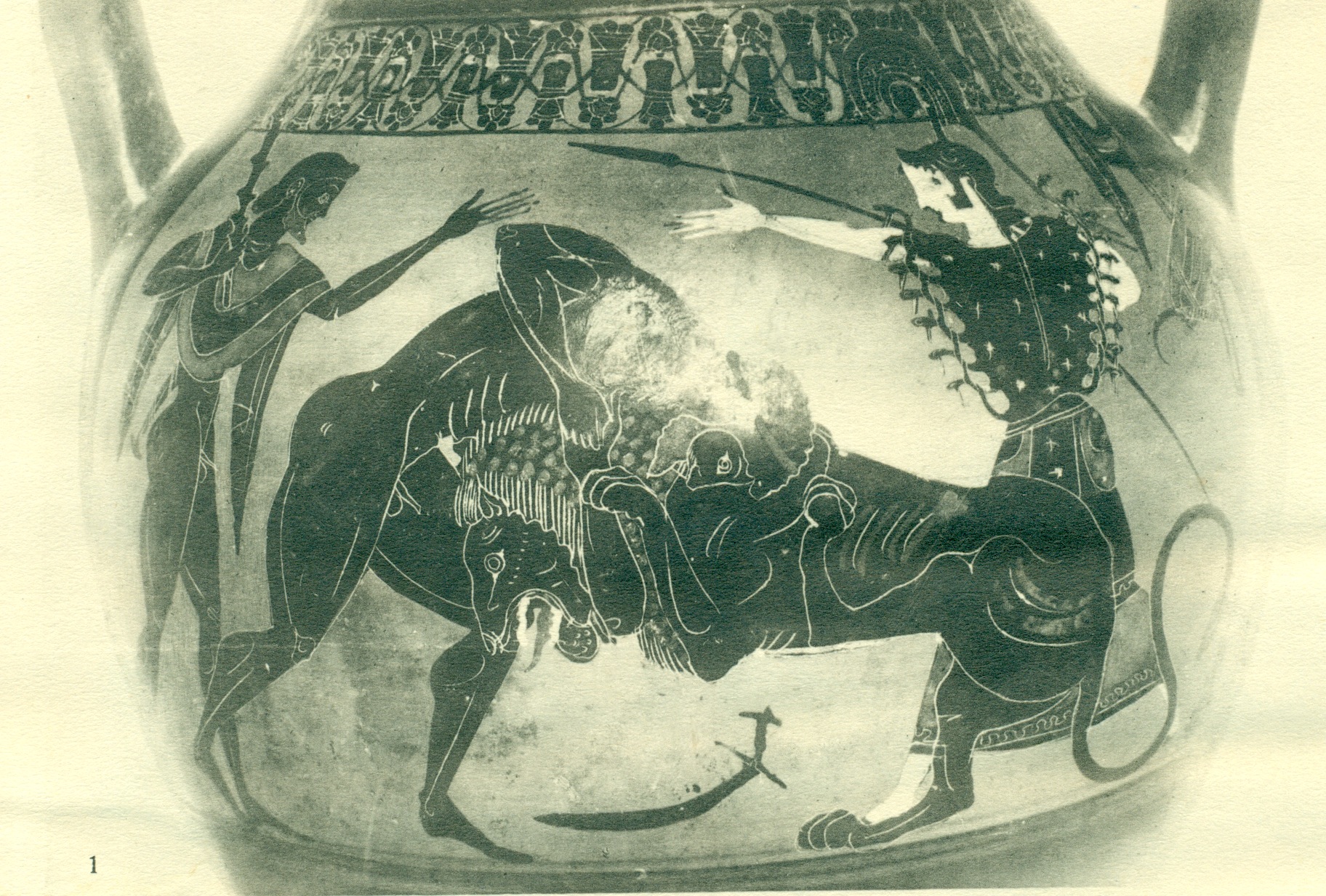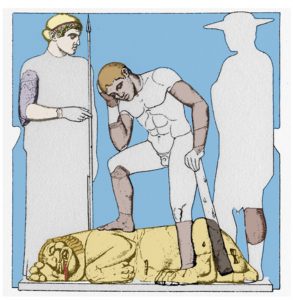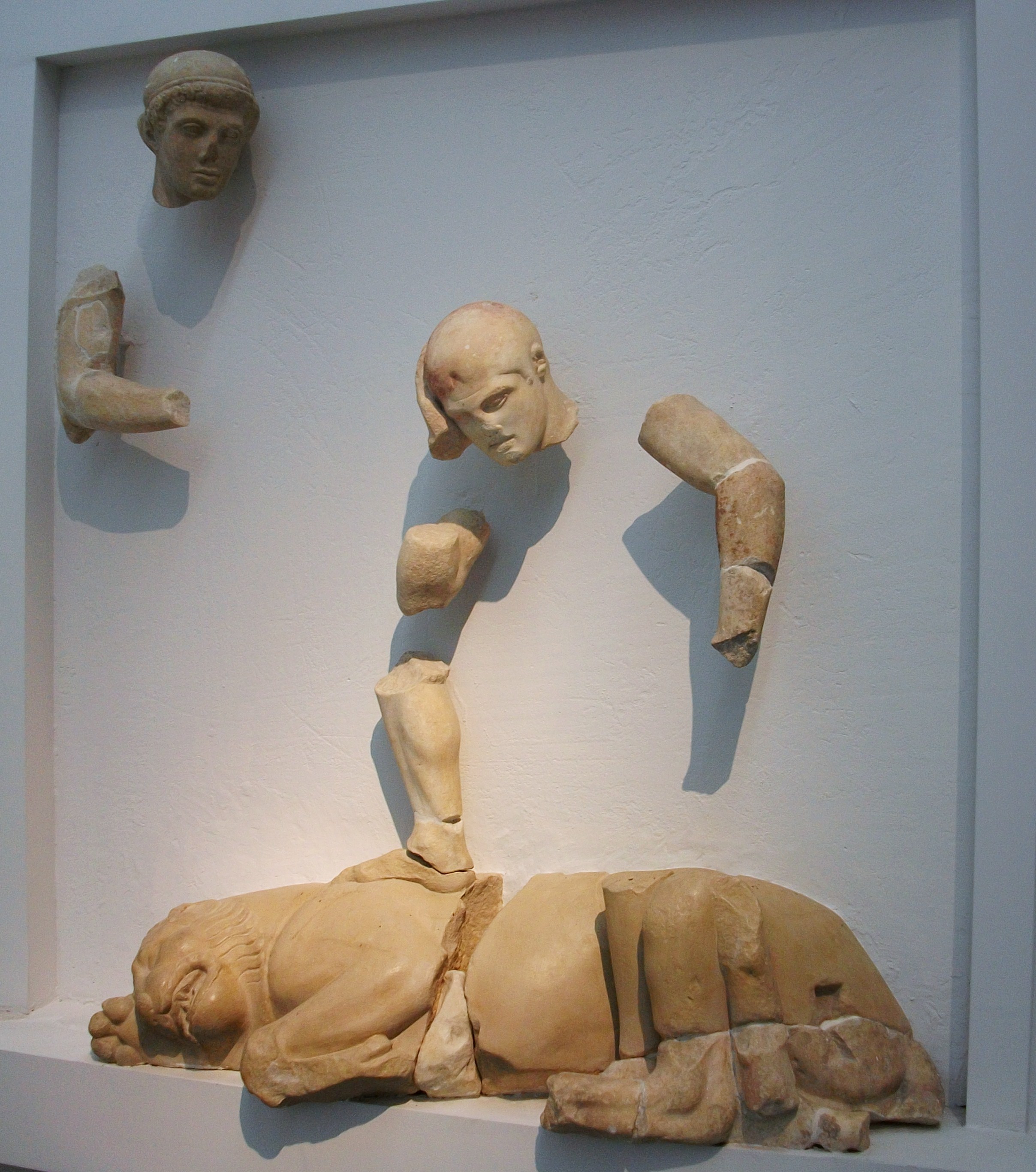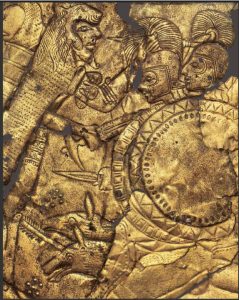Chapter 13: Herakles
Previous Page Table of Contents Next Page
♦ Rome, Museo Nazionale Etrusco di Villa Giulia 50406 (M472): Attic black-figure amphora with Herakles wrestling lion, his bent, useless sword beneath lion; Iolaos (on left) and Athena (on right) encourage Herakles

P. Mingazzini, Vasi della Collezione Castellani: Catalogo (1930), pl. 65.1
Beazley Archive Pottery Database
♦ Munich, Antikensammlungen 2085 (J563): Attic black-figure cup with Herakles reaching with his right hand into and skinning inverted, dead lion, while he holds the lion’s hind legs with his left hand

E. Gerhard, Auserlesene Griechische Vasenbilder, hauptsächlich Etruskischen Fundorts (Band 2): Heroenbilder (1843) pls. 132-3.1-2
Beazley Archive Pottery Database
♦ Olympia Museum: metope from the Temple of Zeus with young, weary Herakles, young Athena and dead lion; Hermes can be restored on the right


Reconstruction drawing (left) of Herakles and lion, from Ernst Curtius [Editor]; Friedrich Adler [Editor]; Georg [Oth.] Treu, Olympia: die Ergebnisse der von dem Deutschen Reich veranstalteten Ausgrabung (Tafelband 3): Die Bildwerke von Olympia in Stein und Thon (1894), pl. 45.1; color reconstruction (right) of metope with Herakles and lion, from G. Nagy, “Thinking comparatively about Greek mythology IV, Reconstructing Hēraklēs backward in time,” Classical Inquiries August 15, 2019


Detail of beardless head of Herakles, from Flickr
Perseus Art & Archaeology Artifact Browser
♦ Samos, Vathy Museum B 2518: detail of bronze pectoral for horse, dedicated to Hera, with Herakles in lionskin slaying Geryoneus; dead guard dog Orthos lies on ground between the two combatants

Detail from K. Tsakos and M. Viglaki-Sofianou, Samos: The Archaeological Museums (John S Latsis Public Benefit Foundation, 2012), fig. p. 156
♠ Theok 25.153-281 – Theokritos, Idylls
[THE NEMEAN LION]
[153] Then did Phyleus and Heracles the mighty leave the fat fields behind them and set out for the town. Their swift feet were gotten to the end of the little path which stretched from the farmsteads through the vineyard and ran not over-clearly in the midst of the fresh greenery, and they were just come to the people’s highway, when the dear son of Augeas up and spake to the child of most high Zeus that was following behind him, and with a little turn of his head over his right shoulder, “Sir,” says he, “there’s somewhat I had heard of you, and O how late am I, if of you it were, to bethink me on’t but now! ‘Tis not long since there came hither from Argos an Achaean of Helicè-by-the-sea, who told a tale, look you, unto more than one of us Epeians, how that he had seen an Argive slay a beast of the field, to wit a lion dire that was the dread of the countryside and had the den of his lying beside the grove of Zeus of Nemea – yet he knew not for sure, he said, whether the man was truly of sacred Argos itself or was a dweller in Tiryns town or in Mycenae. Howbeit, such was his tale, and he said also, if I remember true, that for his lineage the man was of Perseus.
[174] Now methinks there is but one of those men-o’-the-shore could do a deed like that, and you are he; moreover the wild-beast-skin your frame is clad in signifieth clearly enough the prowess of your hands. Come on, my lord, have me well to wit, first whether my boding be true or no, whether you be he the Achaean of Helicè told us of, and I know you for what you are; and then tell me, pray, how yourself destroyed that same pestilent beast and how he came to be dwelling in the well-watered vale of Nemea; for I ween you shall not find such a creature as that if you would, the Apian lands around, seeing they breed not anything so huge, but only the bear and the boar and the fell wolf. Therefore, also did they wonder that heard that tale; indeed they said the traveller lied with intent to pleasure the company with an idle tongue.” Continue Reading Greek Text
♠ Tibullus 3.7.12-13
Indeed, even Alcides, a god who would ascend to Olympus,
placed his auspicious footprints in the house of Molorchos. (Transl. E. Bianchelli) Latin Text
♠ ApB 2.5.1 – Apollodoros, Bibliotheke (Library)
When Hercules heard that, he went to Tiryns and did as he was bid by Eurystheus. First, Eurystheus ordered him to bring the skin of the Nemean lion; now that was an invulnerable beast begotten by Typhon. On his way to attack the lion he came to Cleonae and lodged at the house of a day-laborer, Molorchus; and when his host would have offered a victim in sacrifice, Hercules told him to wait for thirty days, and then, if he had returned safe from the hunt, to sacrifice to Saviour Zeus, but if he were dead, to sacrifice to him as to a hero. And having come to Nemea and tracked the lion, he first shot an arrow at him, but when he perceived that the beast was invulnerable, he heaved up his club and made after him. And when the lion took refuge in a cave with two mouths, Hercules built up the one entrance and came in upon the beast through the other, and putting his arm round its neck held it tight till he had choked it; so laying it on his shoulders he carried it to Cleonae. And finding Molorchus on the last of the thirty days about to sacrifice the victim to him as to a dead man, he sacrificed to Saviour Zeus and brought the lion to Mycenae. Greek Text
♠ Σ Nem Hypothesis – Scholia to Pindar: Nemean Odes – Scholia vetera in Pindari carmina, 3, pp. 1-5, ed. A.B Drachman. Leipzig 1927.
Previous Page Table of Contents Next Page
Tags:
Artistic sources edited by Frances Van Keuren, Prof. Emerita, Lamar Dodd School of Art, Univ. of Georgia, March 2023
Literary sources edited by Elena Bianchelli, Senior Lecturer of Classical Languages and Culture, Univ. of Georgia, December 2020
1,096 total views, 1 views today